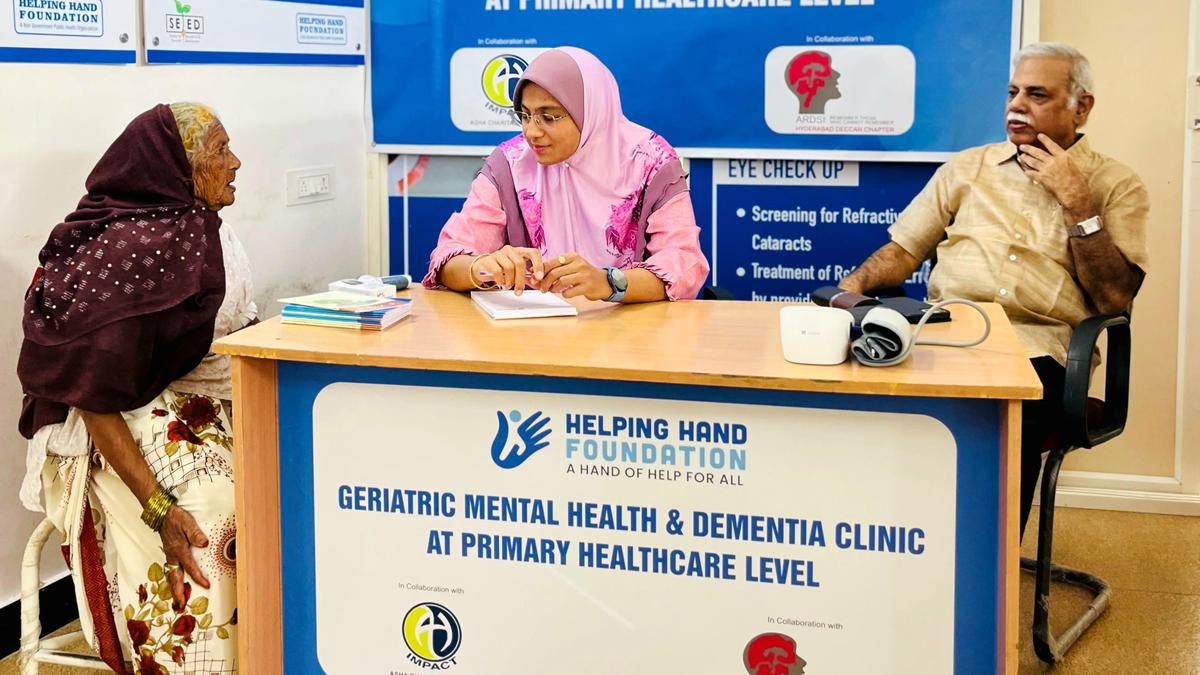Bridging the gap in mental healthcare services: NGOs launch dementia clinics in Hyderabad’s slums


Three healthcare NGOs have come together to establish a series of community-level mental health and dementia clinics in the urban and peri-urban slums of Hyderabad.
| Photo Credit: Special Arrangement
In an effort to fill in lacuna in mental healthcare services, three healthcare NGOs have come together to establish a series of community-level mental health and dementia clinics in the urban and peri-urban slums of Hyderabad. These clinics aim to address the mental health needs of economically disadvantaged populations, where awareness of conditions like dementia remains low.
The NGOs involved are: Helping Hand Foundation (HHF), Asha Charitable Trust, and the Alzheimer’s and Related Disorders Society of India (ARDSI) Hyderabad Deccan Chapter.
Dementia, a progressive neurodegenerative disease, impairs memory, cognition, and behaviour, often complicating daily functioning. A 2022 study by All India Institute of Medical Sciences (AIIMS)-Delhi estimates that 8.8 million people in India live with dementia, while a 2013 survey conducted by Nizam’s Institute of Medical Sciences (NIMS) indicated that Hyderabad alone had over 40,000 cases, a number believed to have since doubled.
One of the key strategies to address the dementia challenge is to invest in early detection and timely intervention, experts point out: up to 40% of dementia cases may be preventable by addressing modifiable risk factors.

PHC-level screening
“For the first time, screenings for dementia and other mental health conditions are being conducted at the primary care level in Primary Health Centres (PHCs) operated by HHF-SEED in the city’s urban and peri-urban slums. These clinics, located at Rajendranagar and Pahadi Shareef, cater to communities with high rates of illiteracy and poverty, where issues related to brain health often go unrecognised, said Mujtaba Hasan Askari of HHF.
Initially, the clinic will focus on screening and support for geriatric patients (aged 55 and above) and individuals with chronic conditions such as stroke, diabetes, and hypertension.
A preliminary neuropsychological assessment, the Hindi Mini-Mental State Examination (HMSE), will evaluate patients’ cognitive function on a 31-point scale, with a score of 23 or below prompting further evaluation using the Addenbrooke’s Cognitive Examination-III (ACE-III). This tool is adapted to accommodate patients’ educational backgrounds and language preferences, validated for Indian patients by experts at NIMHANS, added Mr. Askari.
The management plan for those diagnosed with dementia follows a three-tier approach: medication for symptom control, functional rehabilitation and cognitive stimulation therapy for the patient, and a caregiver support programme to aid families in managing dementia care at the community level.
The initiative is guided by Chandrasekhar K., a geriatric psychiatrist who serves as the managing director of Asha Hospital and president of ARDSI Hyderabad Deccan Chapter. The clinical team includes Najamus Saquib, a geriatric psychiatrist from Asha Hospital, and Saadiya Hurzuk, a dementia expert from ARDSI Hyderabad Deccan Chapter, along with trained counsellors from HHF.

India-wide issue
India currently has 149 million people aged 60 years or above, about 10.5% of the population. By 2050, this figure is expected to surge to 347 million, or 20.8% of the population. India’s elderly population is growing faster than its younger age groups. Life expectancy has risen to 70 years, yet healthy life expectancy lags 6.5 years behind.
While dementia is expected to affect millions of Indian families over the next two decades, mental healthcare services have not kept pace with the magnitude of the problem: In its 2023 report, ‘Mental Healthcare and Its Management in Contemporary Times,’ the Parliamentary Standing Committee on Health and Family Welfare stated that there were 9,000 working psychiatrists in India at the time. If the goal is to have three psychiatrists per one lakh population as per the World Health Organization’s recommendations, India would require 36,000, the report said.
Published – October 29, 2024 12:15 am IST
link





